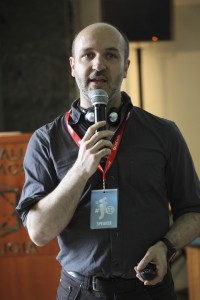Skills of interview: how report the unspeakable

Photo: Ilario D'Amato
One of workshops on International journalism festival was dedicated to interview. But not for its usual form. So specific positions, when journalist and interviewee are in so exciting situation. It may be after or during the war or natural disaster, for example. In other worlds journalist and filmmaker, now the director of «Dart Centre Europe», Gavin Rees told us about the hidden life of interview.
Together with members of Festival he tried to find the answers of such questions like: how does one encourage a victim to accurately relate the story of a violent attack in all its terrible detail without making it worse for them or what does it take for a journalist to sit opposite someone in distress, who may feel that outside world couldn’t care less?
According his professional’s experience, Gavin Rees said that trauma of victims always refers to direct exposure to traumatic content. And at the same time events where somebody feels extreme horror, disgust, fear and helplessness – are the special situations for work of journalist too.
The speaker said about starting points of interview this unspeakable persons.
First of all, we, journalists, must understand, that violence is basic to news. But at the same time we don’t take it literally. Trauma of people who became the victims is not only war and famine. It can be loss of loved ones too…And we must take it like first one.
But at the other hand, trauma changes people. Always. We should to understand, that people’s reaction could be unpredictable and unexpected.
So there are some normal reactions when discussing abnormal situations. He called them «tunneling of focus», «emotional disconnection» and «trouble concentrating». And of course for them it may be difficulty holding a story together and disruption of memory.
It was so useful, that Gavin Rees listed the basics of active listening. You know, that listening – one of the most important things of interview. So what journalist don’t to do during listening? Firstly, don’t rush your interlocutors – let them set the pace, take breaks, don’t fake compassion. And the second one – never push for tears – whatever editors want. It’s bad and nor professional feather for you. Don’t forget about it. Finally, our interviewees must understand that journalists are people too…
By Alina Milovanova
